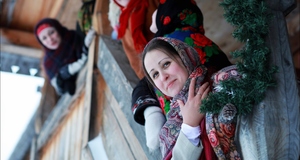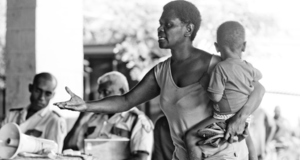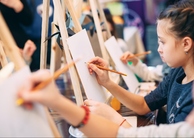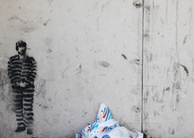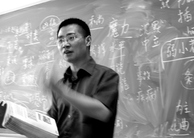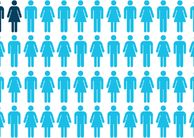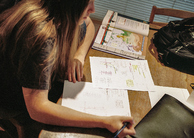The Researcher at the Dance: Epistemology, Ethics and the Ethnographer
By
2015, Vol. 7 No. 03 | pg. 2/2 | « Speaking EpistemologicallyAt this point it is appropriate to explore the epistemological view that is emerging. Epistemology is concerned with the development of knowledge, how meaning and understanding is formed. The metaphor of The Wedding Dance illustrates the social constructive nature of human knowledge. However, before metaphor, the reader must close the cover of the book, and pushing it away from them ask: How is sense made of this text? How is meaning created out of this existence? This reflective exercise demonstrates the epistemological lens used to interpret data. The thesis process teaches the skills of research; it does not teach how to perceive reality. That is what the researcher brings to the thesis. The text offers a picture of a whole; it makes sense because it is a complete text. This text, though, is woven together by individual words, sentences and passages. It contains both micro (individual) and macro (whole) elements. The separate threads of the micro elements weave together in creating the bigger picture—in making sense out of reality. Looking between the lines, behind the words, around the whole, for an understanding of the forces at play in a social reality (or the deeper meaning in a text) is the critical element that allows for what Dewey has called social intelligence (Kaldec, 2007 p. 45). Dewey’s pragmatism did not separate doing and thinking. He saw experience as the repository for critical reflection—through dancing we are able to see the form of the dance and also change or alter it. In reading the text, or the data, we can employ a hermeneutic suspicion that there are underlying features hidden by the surface level. Freire would call this process of ‘clearing the fog’ in which we operate conscientizacao, or conscientisation. Freire (1996) saw people in limiting situations which they could transform once they became conscious of them. Humans are able to become aware of their social reality because they are active agents in its creation. Both Dewey and Freire saw this process as somewhat of a human vocation. For Dewey it was part of ‘democracy as a way of life’—a liberty of thought and action, equal opportunity to freely develop their capacities, and the cultivation of social intelligence. He was guided by an optimism about the human capacity for creative collaboration (Kaldec, 2007). Freire celebrated not a human nature, but a human potential, when he spoke of humankind’s, “power to make and remake, to create and recreate” (1996 p. 71) in a conscious “dance.” Through a social constructionist epistemology, meaning is not discovered but constructed. “All knowledge,” writes Crotty, “and therefore all meaningful reality as such, is contingent upon human practices, being constructed in and out of interaction between human beings and their world, and developed and transmitted within an essentially social context” (1998 p. 42). Language is a vital element in this sense making. “Only through communication,” said Freire, “can human life hold meaning” (1996 p. 58). However, human language and meaning change over time. Knowledge is not a fixed object, it is both historically and culturally placed, and it is constructed through human interaction with each other and with their environment, which is similarly not fixed. Praxis allows an agency in gaining a clearer inter-subjective understanding of everyday life. A social constructionist epistemology affords humans a creative responsibility as they can see the world not only as it is, but also how it can be. To be an active and conscious participant in this creative process is what Freire considered “the people’s vocation.” Wanting to create more inclusive, socially just societies affirms the “struggle to recover their lost humanity” (Freire, 1996 p. 26). Social construction is a never ending enterprise, a process, or project, which makes us human.The Critical EthnographerFor the ethnographic researcher, it is no longer ethically feasible to study from the outside—to be a stranger at the scene of the dance, a party crasher. There is one figure in Brueghel’s painting standing with hands held behind his back, merely watching the revellers. His apparent lack of participation draws the eye; however, he is not totally separate from the festivities. He is still very much a part of the canvass—the time and place. No outsider exists there—no scrutinizer, no curious ‘researcher’. The only outsider is the viewer of the painting, removed by time and culture, having no power or agency over events, and as a result, having no real or meaningful participation in the scene. It is a neutral position, a neutered position that denies the human agency of the observer. Research, without active and transformative participation, is reduced to the voyeuristic appreciation of ‘art’. To Freire, dialogue between participants was as a dance between partners, not one party performing for another, but a full enjoyment of the experience, creating a shared experience (out of love) to heighten the critical awareness of all parties. “At the point of encounter...there are only people who are attempting, together, to learn more than they know” (Freire, 1996 p. 71). The role of the researcher in this process has aptly been described by Giroux: “…academics should combine the mutually interdependent roles of critical educator and active citizen” (2007, p. 198). Gramsci saw the intellectual as an agent of social change, participating in a cultural offensive to reform values that are deeply rooted in popular consciousness (Mayo, 1999). Gramsci used the term “organic” to describe the intellectuals that every social class creates who give a voice and awareness to that social group. Organic intellectuals can support the dominant groups in a society and the status quo. Alternatively, they can challenge this hegemony, or social domination, and contribute to “…intellectual and moral reform” (Gramsci quoted in Mayo, 1999, p. 41). bell hooks succinctly described this when she wrote, “when our lived experience of theorising is linked to processes of self-recovery, of collective liberation, no gap exists between theory and practice” (Hooks, 1994, p. 61). Indeed, even the line between researcher and researched becomes blurred. Both the researcher and the researched work towards a shared vision; for Freire this was the realisation of a better world (Jackson, 2007). The relationship becomes pedagogic, and it is deeply committed, not only to transformative action but to those they teach (Mayo, 1999).There are no neutral observers at a wedding dance. To be a researcher carries with it a responsibility to participate fully with the dancers, to examine with them the nature of the dance. The “organic intellectuals” envisioned by Gramsci shared similar economic interests with those they came into contact with. Their role was not to support a status quo but to, “engage in counter-hegemonic activity” (Mayo, 1999 p. 42). Freire’s educators were problem posing, engaged in a critical and liberating dialogue towards a mutual conscientisation. Educator (researcher) and the people (researched) were uncompleted beings becoming conscious of their incompletion (Freire, 1996). The view that emerges is ecological. Just as removing the dancers from the scene would render Brueghel’s painting mere landscape, and transporting a single dancer elsewhere would equally deprive meaning, so too would be research without agency. The implication here is that the only type of ethnography to ethically practice is a critical ethnography. Critical ethnography allows the researcher to become a participant in the project—placing them, in a Freireian sense, as an agent of social transformation (Freire, 1985). In the process of conscientisation we acquire the ability to not just observe our world, but to transform it by critically viewing the hold our beliefs and values have upon us, as well as the oppressive structure in our societies. Madison (2005) writes that, “critical ethnography begins with an ethical responsibility to address processes of unfairness or injustice within a particular lived domain” (p. 5). These processes are often overlooked. It is not the case that they are invisible, but rather that we have learned not to see them, have even accepted them as the normal state of affairs or simply how things are (Mayo, 1999). Critical ethnography makes it an explicit aim to uncover these hidden or disguised power imbalances. Critical ethnography is a type of reflection that examines culture, knowledge, and action. It expands our horizons for choice and widens our experiential capacity to see, hear, and feel…critical ethnographers describe, analyze, and open to scrutiny otherwise hidden agendas, power centres, and assumptions that inhibit, repress, and constrain. Critical scholarship requires that commonsense assumptions be questioned (Thomas, 1993, pp. 2-3). Whereas the objective of traditional ethnography is to describe a culture (to admire the painting?), the aim of critical ethnography is to change it. The critical ethnographer feels it her or his obligation to use knowledge from research to challenge the existing structures, values, practices that oppress or exclude members of the community. This is what Foucault referred to when he described knowledge as being bound up with power (Burr, 1995). Foucault looked closely at language, discourse, and the construction of knowledge: “to understand the origins of our current ways of understanding ourselves...to begin to question their legitimacy and resist them” (Burr, 1995 p. 69). At this present moment in our societal wedding dance we can no longer be what Bauman has called ‘collectively indifferent’ to the injustices and imbalances of power within our societies (Bauman, 2011). Ethnographers must take their place as conscious dancers and embrace the responsibility of reflecting and acting with the researched (their fellow community members) in true praxis. Freire said that reflection without action was empty “verbalism,” and that action without reflection was potentially worse, manipulative “activism” (Crotty, 1998). The creative responsibility of humankind is not only to see the world as it is, but how it can be. This is the research project in which we are all participating—not a current we are caught in, but the wedding at which we are all dancing. ReferencesBauman, Z. (2011). Culture in a liquid modern world. Cambridge: Polity. Berger, P. L., & Luckmann, T. (1967). The social construction of reality: A treatise in the sociology of knowledge. London: Penguin Burr, V. (1995). An introduction to social constructionism. London: Routledge. Crotty, M. (1998). The foundations of social research: Meaning and perspective in the research process. St Leonards, NSW: Allen & Unwin. Freire, P. (1985). The politics of education: Culture, power, and liberation. London MacMillan. Freire, P. (1996). Pedagogy of the oppressed. London: Penguin. Giroux, H. (2007). Educated hope in dark times: Critical pedagogy for social justice. Our Schools, Our Selves, 17(1), 195-202. Hooks, B. (1994). Teaching to transgress: Education as the practice of freedom. New York: Routledge. Jackson, S. (2007). Friere re-viewed. Educational Theory, 57(2), 199-213. doi: 10.1111/j.1741-5446.2007.00252.x Kaldec, A. (2007). Dewey's critical pragmatism. Plymouth: Lexington Books. Madison, D. S. (2005). Critical ethnography: Method, ethics, and performance. Thousand Oaks: Sage. Mayo, P. (1999). Gramsci, Freire and adult education: Possibilities for transformative action. London: Zed Books. Thomas, J. (1993). Doing critical ethnography: Qualitative research methods series #26. Newbury Park: Sage. Suggested Reading from Inquiries Journal
Inquiries Journal provides undergraduate and graduate students around the world a platform for the wide dissemination of academic work over a range of core disciplines. Representing the work of students from hundreds of institutions around the globe, Inquiries Journal's large database of academic articles is completely free. Learn more | Blog | Submit Latest in Education |






